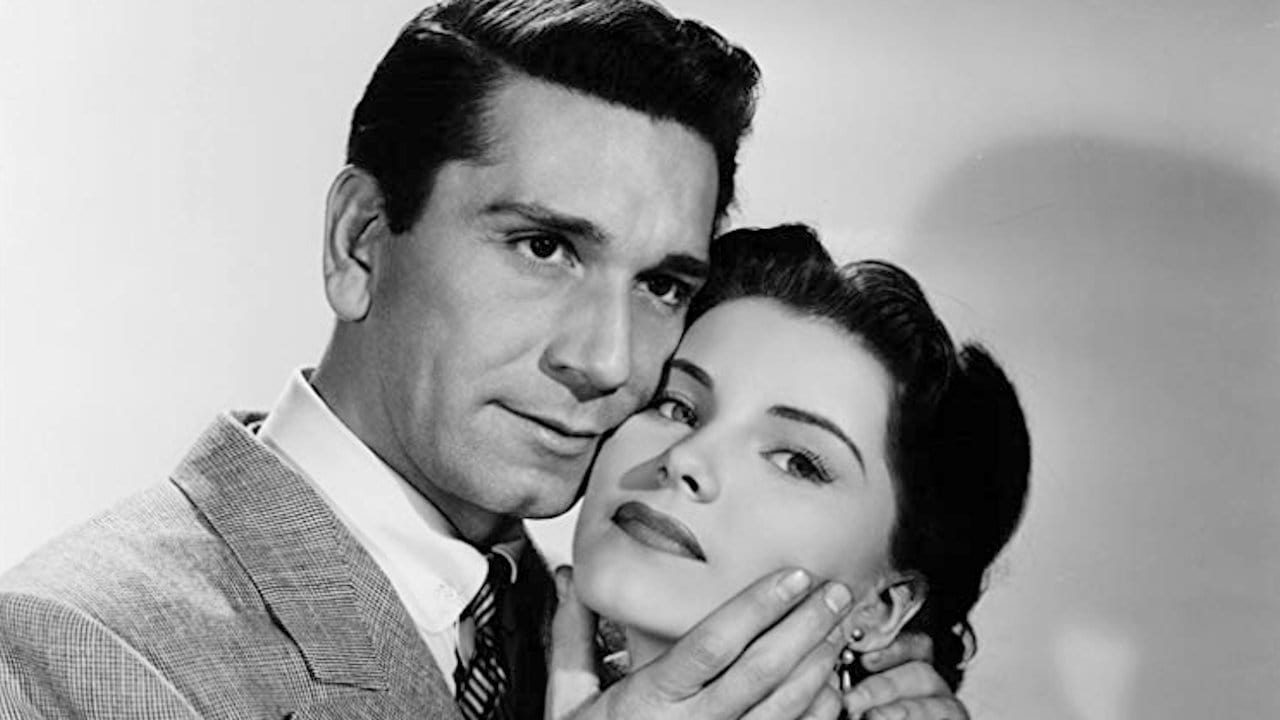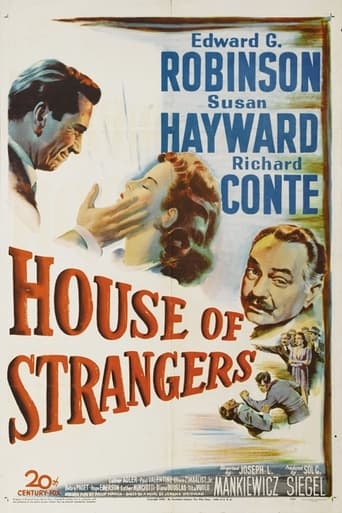

This is one of Joe Mankiewicz' lesser known films (birthday today 11.2) and definitely among his best ones. Edward G. Robinson performs at his best as the Italian father of a banking family with four brothers embroiled with each other, as usual in Mankiewicz's films a brilliant dialogue mesmerize you all through, Susan Hayward also making a splendid performance. Richard Conte plays the one son who acts honourably, while all the others turn against him and betray their father out of necessity to survive – and let Conte pay for it. When he is freed from prison (which is where the film begins, and we know nothing yet of what has passed), the immediate meeting with his brothers creates the suspense which lasts and constantly grows tighter through the entire film, until the conflict is resolved in the end after many unexpected turns. All actors are at their best, while the lasting impression is made by Conte as a paragon of straight Sicilian nobility, Susan Hayward as a surprising woman of superior character, and above all Edward G. Robinson as the father, who although powerful and successful can't quite follow the new turns of his age. Although autocratic he never becomes unsympathetic, but you rather understand him and have to pity him - he is the tragedy, in a marvellously well-written film script (as all of Joe Mankiewicz' films are) perfectly handled by a masterful director and a set of actors together creating a virtuoso family performance.
... View MoreSuperb movie, superbly done; and one quite underrated at that. The Greek tragedy of a father setting three of his sons against himself while grooming the fourth and youngest as his successor. Now, allow me to say that many reviewers have gotten HOS wrong. This is not a tale of greedy sons robbing their father of his wealth but a gripping drama about child abuse and humiliation. So, let's set the record straight on that. That also concerns the bank.The problem is, people tend to feel so comfortable with some ideas that many times they subconsciously juggle facts to fit them, oblivious many times to clear evidence pointing in some other direction. Ex.: most of us see a bank as a source of wealth and power. That's the way we see them and so it got to be for Joe, Tony & Pietro. Wrong. For these men the bank is simply the bat with which their father hits them for not being like his favorite, Max. When we see them as such, as kids who have been tormented all their lives by a monster of a father, the picture changes and the trio appears instead as victims. Victims who, by a providential strike of luck, are finally given the chance to snatch the instrument of torture from their tormentor's hands and use it to regain the dignity and self-esteem he has taken from them. So there's nothing nefarious about what they did. They deserved what they got and also he. What best proves the point is that there's absolutely no hint that they did it for greed. If you remember the first part, you may recall that their main complaint against Gino was not about money, but about never getting any respect from him. Furthermore, if you take note of the abuse he's constantly pouring on them now, when they are adults, imagine how bad it must have been when they were kids. But Gino's cruelty goes even further as, at the smallest show of discontent he challenges the rebel to go look for a job elsewhere. That's even sadism, as he has deprived them since childhood of the indispensable tools for success and self-reliance in life: dignity & self-esteem. That's why I reject the analogy with Don Corleone, who I don't recall humiliating his kids that way. Gino is far worse than him. An egomaniac to whom the entire world must adapt, obey: relatives, random acquaintances—to whom he may hit in a whim--the judiciary, the government. There's no limit to his ego and those closest to him are the ones suffering the most. All them are his victims, specially his long suffering wife, who evades the unpleasant reality searching for the cause for the general unhappiness in cultural alienation—but who finally does the right thing, giving her sons their due. And where all this leaves Max, Irene?.Max is the one holding the plot together and it's through his memory that the story unfolds. With Max comes Irene. Now, this is an incredibly well constructed psychological drama, which is hinted by what critics say about its ambiguity and shades of gray--things are not as they appear at first--and that's because this is not a story told by a neutral, uninvolved, storyteller but Max's reminiscences of the past, so it is a subjective view of things. What we see here is Max's journey into his own memory and that's what brings all the confusion and why Gino appears at first as an unmethodical, yet sympathetic, banker only to gradually go showing his true colors as Max goes on peeling him layer by layer. The same with Irene, who's introduced as an aggressive, sharp tongued vamp, only to come out at the end as a woman in love; a force for good fighting for his soul against the evil in Gino. But the crucial discovery in Max's journey concerns himself. For the first time he sees who he really was, the man that Gino had made to his own image, his creature, who's shown to him now even in his choice of words--"I'm Max Monetti and nobody talks to me like that". And for the first time he realizes how right were all those trying to rescue him from his father's poisonous influence: Irene, his mother, his brothers. And he realizes too that Gino had no intention of ever giving any power to his brothers in the bank, as he was grooming him to continue with his legacy of hatred and contempt. That's why Max comes converted out of his reminiscence and why he has decided to go away. There's is where Irene plays her crucial role. She not only means redemption to him, but also hope, a new future, the breaking of old chains. Without her he got nothing but loneliness in which case he probably wouldn't have even bothered stopping Pietro from killing Joe, letting the family destroy itself. Maria would have never done that for him; she would have just left him be what Gino wanted, his own clone.Great movie, almost perfectly done. Superb acting by all, Paget with too little to chew. Just one flaw: Max's conversion appears too abrupt. His final words to Gino too casual, almost jovial. It should have all taken more time, more pauses, more thoughtful gesturing. And I don't get why they call this one noir when, apart from the cinematography, there's very little noir here--maybe Max, always with that dark cloud hanging over his head. Also I don't think it has anything to do with any immigrant experience. The Monettis could be any family, in any place on Earth. In all, 8.5/10.
... View MoreJoseph L. Mankiewicz had an amazing fun in Hollywood during the late 1940s and into the 50s. Aside from his HUGE misfire later in life ("Cleopatra"), he had an incredible string of successes--one brilliant film after another. Just think about it--he directed "A Letter to Three Wives", "House of Strangers", "No Way Out", "All About Eve" and "People Will Talk" all one after the other! Any one of these films would make a director proud--and yet Mank also wrote these films! Wow."House of Strangers" is unusual for me because I rarely watch a movie more than once (this could explain part of how I've reviewed so many movies). But, because I loved it so much the first time, I thought I'd watch it again. The film was remade only a few years later as "Broken Lance"--also a good film but not in the same league as "House of Strangers". It was also remade only a few years after that as "The Big Show". Obviously, it was an awfully good script.The film begins with one son (Richard Conte) arriving at his huge family home. It seems he'd just completed a stretch in prison. Why he went to prison and what's happened in this family unfolds slowly through the course of the film. I really like this style. Instead of telling a straight sequential narrative, this approach increases the suspense greatly.As for the rest of the cast, the film is filled with some great talents. Edward G. Robinson is at his best as a manipulative and dictatorial family patriarch--and proves he was much more than a one-note actor who played gangsters. Luther Adler, Susan Hayward and even a young Efrem Zimbalist Jr. are on hand to round out the cast. And, although I mentioned him earlier, Conte is great--and it's one of his best roles (along with the highly underrated "Thieves' Highway").The bottom line is like the best of Mankiewicz's films, it's all about PEOPLE and ACTING. You don't watch a Mankiewicz film for spectacle or action (thus the failure of "Cleopatra") but for dynamite acting, great characters and dialog--fantastic, fantastic dialog. For example, watch the scene where Hayward and Conte first meet--it's brilliant and memorable. Also, the ending is just great--very tense and very brutal--sort of like a 'family noir' picture!
... View MoreAn immigrant Italian family squabbles over its banking business in 1930s NYC. Robinson is fabulous as the patriarch of the family, who runs a shady business and alienates three of his sons by showing favoritism towards the fourth. Conte is equally good as the favorite son, a no-nonsense attorney. Hayward completes the trio of stellar performances as Conte's tough girlfriend. The script is excellent, with elements of it foreshadowing "The Godfather." Mankiewicz directs with a sure hand. The dialog is sharp and witty, particularly in rapid-fire exchanges between Conte and Hayward. The film also finds time for humor, including a hilarious steam bath scene.
... View More